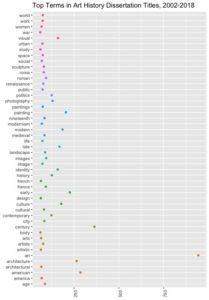Wednesday, 23 September
7.30pm, ZOOM
ZOOM LINK
Nancy Um, Binghamton University
Mapping the Discipline, Plotting the Data of the History of Art
 In this talk, I will trace two overlapping narratives about digital art history. One is oriented on a small scale, related to my own move toward digital art history, as a response to certain unsurmountable obstacles in my research program and the possibilities that computational approaches provide for contemporary scholarship. The other is much wider and treats a dataset, culled from the College Art Association dissertation roster, which includes thousands of titles that have been written by art historians over the past sixty years. These two narratives will be presented as a connected story, in order to shed light on the constrained conditions within which we undertake the study of art history currently, while also considering the potential scope for digital humanities projects and looking closely at the processes that undergird them.
In this talk, I will trace two overlapping narratives about digital art history. One is oriented on a small scale, related to my own move toward digital art history, as a response to certain unsurmountable obstacles in my research program and the possibilities that computational approaches provide for contemporary scholarship. The other is much wider and treats a dataset, culled from the College Art Association dissertation roster, which includes thousands of titles that have been written by art historians over the past sixty years. These two narratives will be presented as a connected story, in order to shed light on the constrained conditions within which we undertake the study of art history currently, while also considering the potential scope for digital humanities projects and looking closely at the processes that undergird them.
Nancy Um is professor of art history and associate dean for faculty development and inclusion at Harpur College of Arts and Sciences at Binghamton University. She received her MA and PhD in art history from UCLA in 2001.
Um’s research explores the Islamic world from the perspective of the coast, with a focus on material, visual, and built culture on the Arabian Peninsula and around the rims of the Red Sea and Indian Ocean. Her first book The Merchant Houses of Mocha: Trade and Architecture in an Indian Ocean Port (University of Washington Press, 2009) relies upon a cross-section of visual, architectural, and textual sources to present the early modern coastal city of Mocha as a space that was nested within wider world networks, structured to communicate with far-flung ports and cities across a vast matrix of exchange. Her second book, Shipped but not Sold: Material Culture and the Social Protocols of Trade during Yemen’s Age of Coffee (University of Hawai’i Press, 2017), explores the material practices and informal social protocols that undergirded the overseas trade in 18th C Yemen. She has received research fellowships from the Fulbright program, the National Endowment for the Humanities, the Getty Foundation, and the American Institute for Yemeni Studies. From 2015-2018, she served as the Reviews Editor for The Art Bulletin.
Currently, Um is engaged in a study of porcelain around the Red Sea in the early 18th C, research on diplomatic relations between Ethiopia and Indian Ocean polities in the 17th C, a comparative study of 17th C images of the port of Mocha, and a computational analysis of the past forty years of dissertations in art history in North America.